What to know
- Reptiles and amphibians are more likely than other pets to carry harmful germs that can make people sick.
- Children under 5, adults over 65, and people with weakened immune systems are more likely to get sick from these germs.
- Wash your hands after handling reptiles and amphibians, their food, or items in their environment.
- Provide your pet reptile or amphibian with routine veterinary care to keep it healthy and prevent the spread of disease.
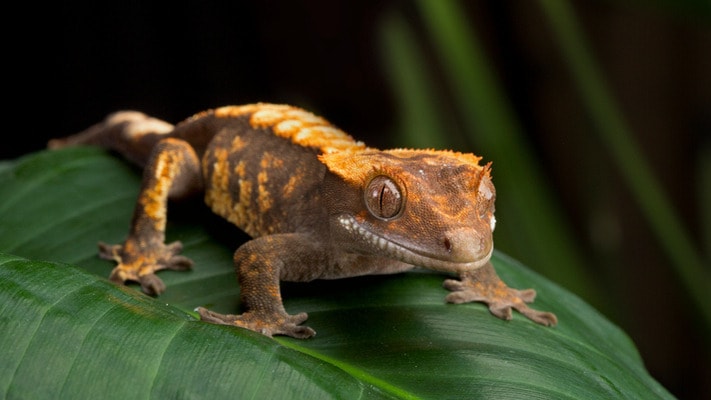
Overview
Millions of households in the United States own at least one reptile (like a turtle, lizard, or snake) or amphibian (like a frog, salamander, or caecilian). Reptiles have dry and scaly skin, whereas amphibians have smooth, slimy skin.
Reptiles and amphibians are more likely than other pets to carry germs that make people sick, even when they appear clean and healthy.
The most common germ carried by reptiles and amphibians is Salmonella. Reptiles and amphibians often carry Salmonella bacteria in their digestive tracts. Even healthy reptiles and amphibians can carry the bacteria. People can get sick from Salmonella bacteria through contact with reptiles, amphibians, or their environments, including water from their tanks or aquariums.
If you decide that a reptile or amphibian is the right pet for you, it's important to learn how to properly care for your pet. Appropriate husbandry and veterinary care can help keep you both safe from illness.
How to stay healthy around reptiles and amphibians
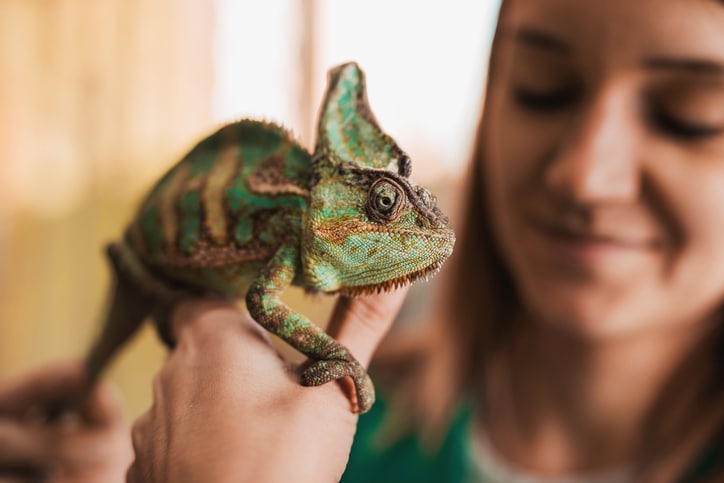
Before buying or adopting a pet reptile or amphibian, make sure it is the right type of pet for your family. Some reptiles can live for a very long time. Reptiles and amphibians require special care and are more likely than other pets to carry germs that make people sick, like Salmonella, even when they appear clean and healthy.
Not recommended for certain people
Wash your hands
Wash your hands with soap and running water:
- After feeding your pet or handling pet food
- After handling your pet's poop or equipment (for example, cages, aquariums, rocks, enrichment, tank decorations, tank water)
- After cleaning your pet's tank or aquarium
- Before eating and drinking
Use hand sanitizer with at least 60% alcohol if soap and water are not readily available. Supervise young children when they use hand sanitizer to prevent swallowing alcohol.
Safely care for your pet reptile or amphibian
Children's safety
Children younger than 5 years old should not handle or touch reptiles or amphibians or their environments because they are at a higher risk for serious illness and hospitalization caused by Salmonella infection.
Don't cross-contaminate
You don't have to touch a reptile or amphibian to get sick from the germs they carry. Reptile food, tank water, equipment, and habitats can be contaminated with Salmonella and other germs.
Keep reptiles, amphibians, and their equipment out of the kitchen or anywhere that food is prepared, stored, served, or eaten. Don't allow reptiles or amphibians to roam freely throughout a home or living area. Supervise your pet when outside of its habitat to prevent accidents and contamination.
Safely feed your pet reptile or amphibian
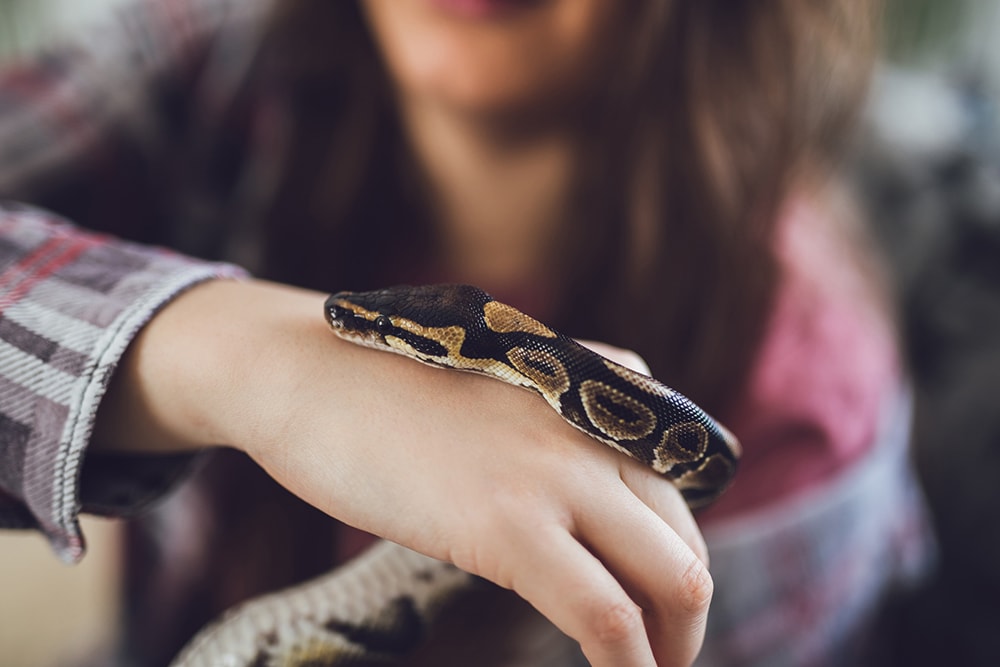
Keep pet food separate
Use a designated container for storing and thawing frozen food for your pet. Keep the pet food away from human food.
Wash your hands and clean the container immediately after feeding pet reptiles and amphibians.
Using feeder rodents
Frozen or live rodents used for pet food, also called feeder rodents, can carry germs that can make people sick. This can happen even if the rodent looks healthy and clean.
Certain people shouldn't handle feeder rodents
Freezing feeder rodents does not kill germs. Always wash your hands after handling live or frozen rodents or touching anything they came in contact with.
Clean and disinfect all surfaces and supplies that come in contact with rodents. Rodents can contaminate surfaces where they are thawed or anything they touch. You can get sick by touching contaminated surfaces; you don't have to touch the rodents to get sick from their germs.
Keep rodents and their supplies out of the kitchen or other areas where food is prepared, served, or consumed. Never use the kitchen sink or food preparation areas to thaw frozen rodents or to clean live rodent habitats. Do not thaw frozen rodents in the microwave.
Clean rodent supplies outside your home when possible. If you clean rodent supplies indoors, use a laundry sink or bathtub, and thoroughly clean and disinfect the area right after. Use frozen rodents when possible to reduce the risk of injury to your or your pet. Never feed your pets wild rodents.
Safely clean your pet reptile or amphibian's habitat
Animal supplies such as tanks, feeders, water containers, and other pet equipment or materials should be cleaned outside the home if possible. Never use food preparation areas to clean reptile and amphibian habitats or equipment.
If you clean supplies outside, do so away from gardens or other sources of food or drinking water.
If cleaning outside the home isn't possible, clean supplies in a laundry sink or bathtub. If you clean supplies in the bathtub, thoroughly clean and disinfect the area before use by others. Pour tank water and other wastewater from reptile and amphibian habitats down the toilet instead of sinks or drains.
Prevent reptile scratches and bites
Not all reptiles and amphibians have teeth, but even those who don't (like most turtles) can still have painful bites. Bites from reptiles and amphibians can be dangerous because they can spread germs and sometimes other toxic substances, depending on the type of animal. Bites and scratches can be serious injuries and sometimes can become infected.
How to prevent bites and scratches
Don't kiss or hold reptiles or amphibians close to your face, as this might frighten them and increase your chances of being bitten.
Make sure the animal sees you before you pick it up. If an animal is surprised, they might bite out of fear.
Feed your reptile with tongs. Don't give them food from your hand. Handle your pet often so they become used to being held. If you only handle your pet to feed them, they might learn to associate a hand with food.
What to do if you are bitten or scratched
Wash bites and scratches immediately
Seek medical attention, especially if:
- The animal appears sick or is acting unusual.
- The wound or injury is serious (uncontrolled bleeding, unable to move, extreme pain, muscle or bone is showing, or the bite is over a joint).
- The wound or site of injury becomes red, painful, warm, or swollen. (Especially if the person bitten is younger than 5 years old, 65 or older, pregnant, or has a weakened immune system.)
- It has been more than 5 years since your last tetanus shot.
If the animal becomes sick or dies after biting a person, let your veterinarian know within a few days to a week. They can determine whether the animal might have had germs that could spread to people.
Venomous reptiles and amphibians
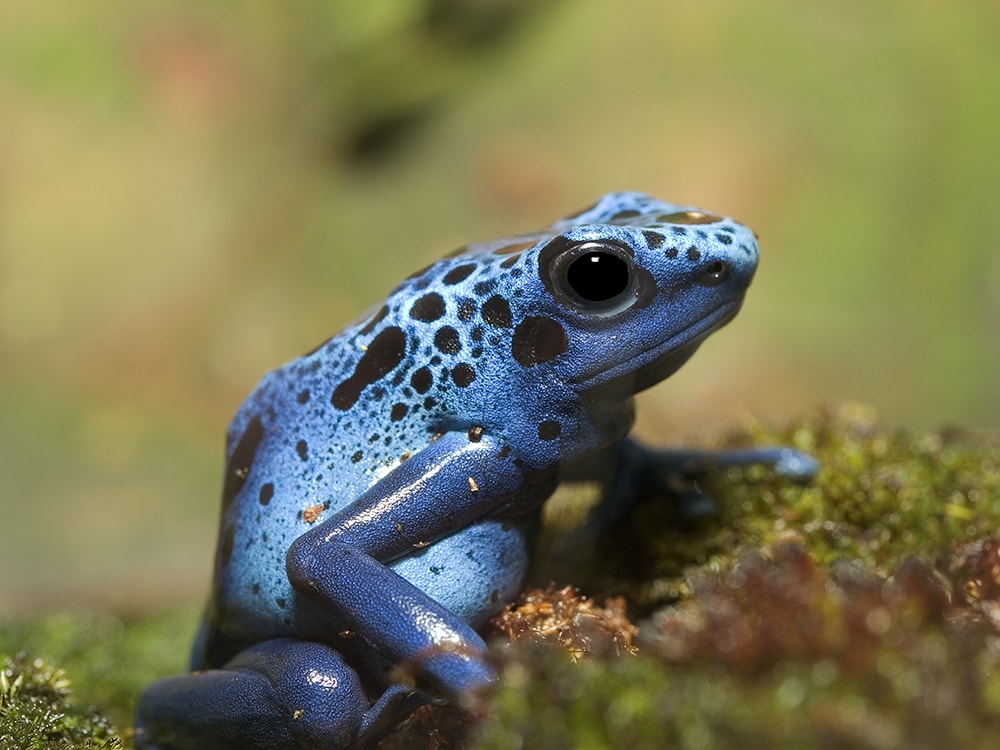
CDC does not recommend keeping venomous animals as pets or in household settings.
Venoms are a defense that some reptiles and amphibians use to protect themselves from any potential dangers or harm in their environment. Some venomous animals, like poison dart frogs and coral snakes, can be identified by their bright colors and markings. However, some venomous animals are harder to identify. Some animals can transmit venoms through bites or through contact with their skin or saliva.
You should always consider the unpredictable nature of venomous animals and be aware that treating a bite from a venomous animal is difficult. Venoms are very toxic and can have severe and life-threatening effects. Antivenoms can treat some bites, but these medications can cost hundreds of dollars and might not be available at some hospitals. In addition, antivenom sometimes can cause allergic reactions that can be just as dangerous as the venom itself.
If you keep or work with venomous animals, make a list of all the hospitals in your area that stock antivenoms for those types of animals. Include hospital phone numbers and addresses. Put this list somewhere easy to find, like on your refrigerator or near the animal's habitat.
What to do if you are bitten by a venomous animal or get venom on your skin
Seek medical attention for venomous bites
Call your healthcare provider as soon as possible so that they can prepare the appropriate antivenom. Be as clear as possible about the type, colors, and markings of the animal. Correct identification of the animal helps healthcare providers to provide the appropriate treatment.
Don't handle or trap the animal, because venom can be dangerous even after the animal has died. Remain as calm and still as possible until you can be treated by a healthcare provider.
Apply first aid:
- Lay or sit down. If possible, position the bite so that it is below the heart.
- Remove rings and jewelry before swelling begins.
- Wash the wound with warm water and soap.
- Cover the wound with a clean, dry bandage.
- Go to the hospital as soon as possible. Fast treatment will reduce damage caused by venom and improve chances for recovery.
- Don't drive. Snake bites can cause dizziness and fainting.
How to keep pet reptiles and amphibians healthy
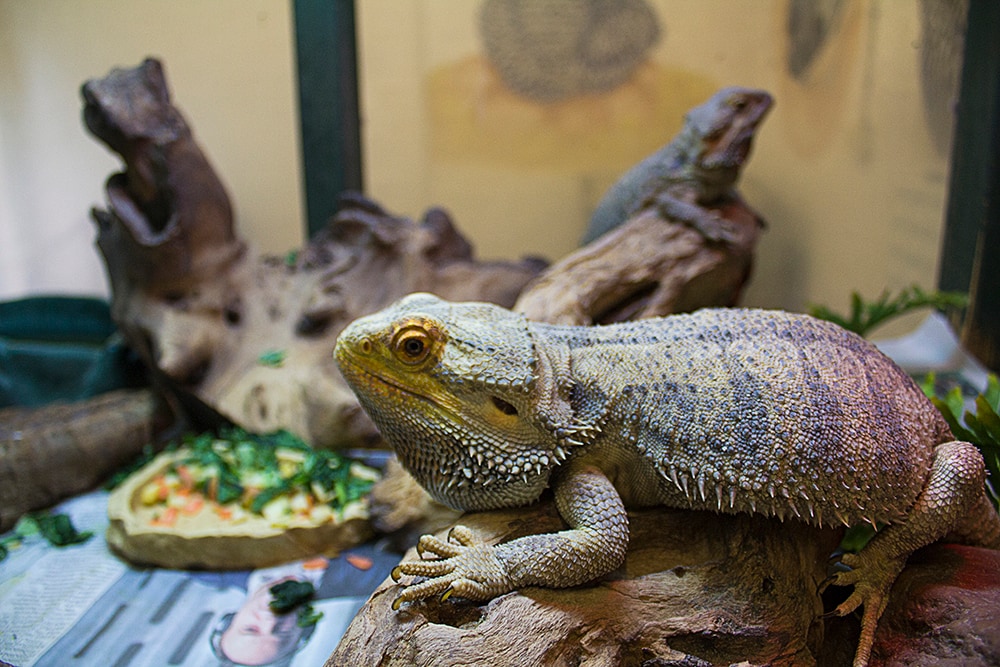
Before choosing a pet reptile or amphibian
Think about the people in your household. Some people are at higher risk for serious illness from germs reptiles and amphibians can carry, especially children younger than 5 years old, adults 65 and older, and people with weakened immune systems.
Do your research
Research and learn how to properly care for reptiles and amphibians before buying or adopting. Ask a veterinarian about the proper food, care, environment, and other needs of the specific pet you are interested in adopting.
Find an exotic veterinarian in your area
Reptiles and amphibians require specialized care. Most veterinarians do not treat reptiles or amphibians.
Check local laws
Check state, local, and property laws before selecting or purchasing a reptile or amphibian. Some reptiles or amphibians might not be allowed in apartments or rental homes. Do not keep venomous animals as pets or in household settings.
Did You Know?
How to choose a pet reptile or amphibian
Remember that some reptiles and amphibians can live for a very long time. Make sure you are prepared for the commitment of caring for the animal during its long lifespan.
Choose healthy animals
Ask about the animal's diet and if it has been eating (if an animal isn't eating, there may be a health problem).
Don't keep wild animals as pets
Don't catch wild reptiles or amphibians and keep them as pets.
Buy turtles with shells longer than 4 inches
Federal law bans the sale of small turtles, although some are illegally sold in souvenir shops and at roadside stands. Buy only from a trusted pet store and avoid roadside or temporary vendors.
How to house your reptile or amphibian
Provide your reptile or amphibian with a safe, warm, and comfortable environment that has the appropriate humidity levels and lighting. Reptiles and amphibians often have very specific requirements for their habitats. Talk with your veterinarian about your pet's needs.
Don't allow pet reptiles and amphibians to interact with or eat wild animals.
Monitor your pet's health
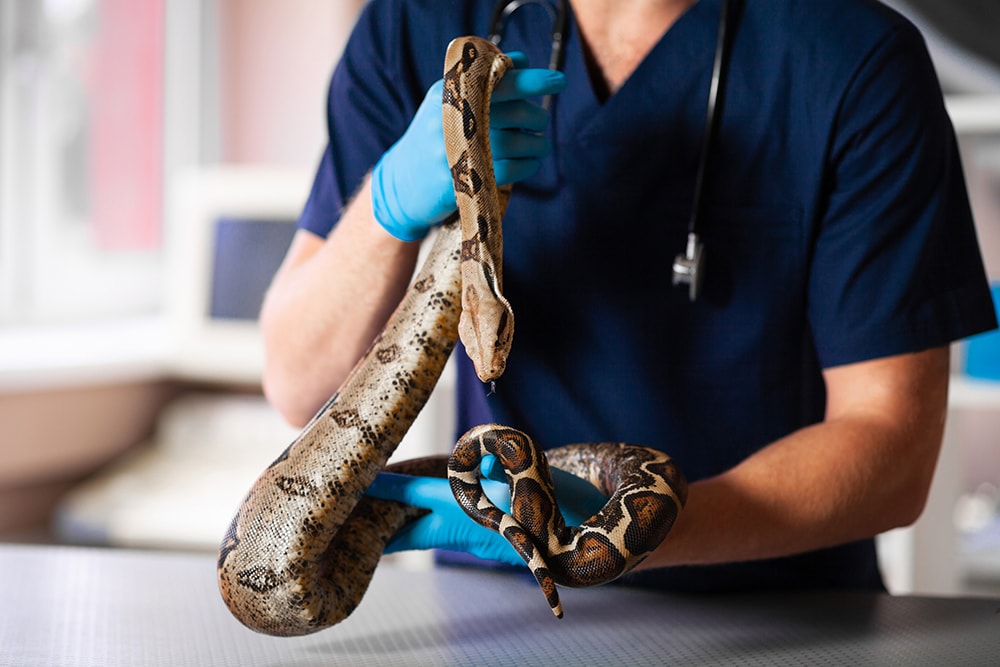
Learn about proper management of your reptile or amphibian's health, including temperature and humidity requirements. Taking good care of the animal can decrease your pet's stress and the chances of it getting sick.
To keep your pet as healthy as possible, visit an exotic veterinarian experienced in reptile and amphibian care (herpetology) for regular check-ups. A veterinarian will not be able to prevent your reptile or amphibian from shedding Salmonella because these bacteria are normally found in healthy reptiles and amphibians.
If your pet becomes sick or dies soon after purchase, take it to the veterinarian and inform the pet store or breeder about the pet's illness or death. Consider waiting before purchasing or adopting another pet. Do not use the habitat until it has been properly cleaned and disinfected. These practices will help prevent the spread of disease.
What to do if you no longer want your pet reptile or amphibian
Don't release unwanted pets
Find a new home for your pet:
- Contact a nearby pet store for advice on rehoming your pet.
- Contact a local pet rescue group to see if they can help rehome your pet.
- Contact a local aquarium or zoo to see if they would accept your pet.
Resources
Selecting and caring for a pet reptile or amphibian
- Selecting an Amphibian (American Veterinary Medical Association)
- Selecting a Reptile (American Veterinary Medical Association)
- So You Think You Want a Pet Reptile or Amphibian? (Food and Drug Administration)
- Find a Vet (Association of Reptile and Amphibian Veterinarians)
Importing reptiles and amphibians into the United States
- Bringing a Turtle, Snake, or Lizard into the United States
- Pet Travel—Bringing Pet Reptiles into the US (US Department of Agriculture)
Educational materials
- The Trouble with Tiny Turtles (Poster)
- Wash Your Hands After Touching, Feeding, or Playing with Your Pet Reptile (Sticker)
- Healthy Herp Handling [PDF – 1 page] (Pet Industry Joint Advisory Council)
Podcasts
- Don't Kiss a Frog!
- Spanish version
- Water Frogs, Aquariums, and Salmonella — Oh My!
- Wash Away Salmonella
- Salmonella from Baby Turtles
